Hit Channel Exclusive Interview: 21st June 2012. We had the great honour to talk to a legendary musician and founding member of King Crimson and Emerson, Lake & Palmer: Greg Lake. He has also collaborated with Ringo Starr and His All-Starr Band, The Who and Gary Moore. His “Songs of a Lifetime” tour will hit U.K in November 2012 and we’re also waiting for the release of his autobiography. Read below the very sincere things he told us:
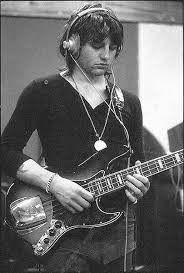 How did the recent American “Songs of a Lifetime” tour go?
How did the recent American “Songs of a Lifetime” tour go?
It was fantastic! Before the beginning of the tour, I sat in my home, in London and asked myself: “What are you going to do?” But when I started the concerts the audience’s reaction was just absolutely fantastic. It was very emotional and I was really like being in the middle of a huge family. We were re-living this musical era and that was happening with shared music.
You will tour in U.K in November. What fans should expect from these shows?
I will be doing exactly the same set that I was doing in the United States. It’s just a journey through older songs that meant a lot to me and I have shared together with the audience over the past 40 years. I did the choice of songs while I was writing my autobiography called “Lucky Man”. It was during the writing of that, when I realised that these songs represented this journey that audience and I have shared over these many years. I did the selections of these songs and what I do in the shows, is playing these songs and I tell stories about my memories of them. And I do like the audience to tell me stories about their memories of them, too. So, it’s an open form really, it’s a kind of interactive show in a way. Some of the stories of course are very emotional and sometimes you see people cry in the audience, sometimes there is a lot of laughing. It’s like a rollercoaster really and it’s just a fantastic look back over the last 40 years of music through my eyes, really. Though the eyes of someone who lived with King Crimson and Emerson, Lake & Palmer.
Are you doing any recordings this period?
I recorded the last tour in America and I am going to release an album from that. I’m just working on a new studio album right now.
Can you reveal to us any special guests?
No (laughs). As far as the live show goes, I like to keep as much as a surprise I can. I never liked to talk about albums before them finished.
Your autobiography will be released soon. How emotional was the writing process?
The writing process was strange. When I started it, I couldn’t remember anything. I couldn’t remember my name. But after a while, as I began to write it, stories started to come back to me and as soon as the time framed in place, it begun to take shape. Of course, when you’re talking to your friends about it, they could remember things and slowly-slowly all comes bloody back.
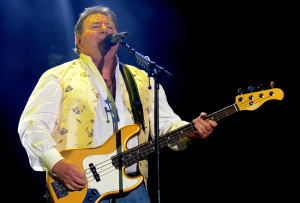 Two years ago, ELP reunited for one show in London. Did you enjoy that appearance?
Two years ago, ELP reunited for one show in London. Did you enjoy that appearance?
Yes, it was fantastic. Again it was a very nostalgic show and a fantastic atmosphere. It was really an incredible thing to rejoin the ELP audience again after so many years.
Do you think ELP have a future as a band?
(Pause) I don’t know. You can never say never. I would like to tell you this: If Keith (ed: Emerson, keyboards) and Carl (ed: Palmer, drums) are ready to tour, then I would be happy to go on tour.
Steven Wilson (Porcupine Tree) just remixed the first two ELP albums. Did you have any involvement in this project?
No, really.
Did you listen what he did?
Yes, he’s very talented guy. For me, making records is a very creative process. Once the record is made, it’s like history for me. Revisiting it, it comes back to life.
Can you describe us your feelings playing at California Jam (1974) in front of a so huge crowd?
Yes, it was an amusing experience. It was like looking at a carpet. When you look at the audience, it becomes just one huge sea of people. It’s a strange experience because you are no longer playing to an individual person. When I play in a concert in an arena or a theatre, I really have the feeling of performing in just one person. But when you got that situation, playing in 300.000 people, it really becomes like playing to an ocean. It’s a strange feeling, it’s not so stressful as you might think. I think in many ways, the smaller the audience, the more nervous I become.
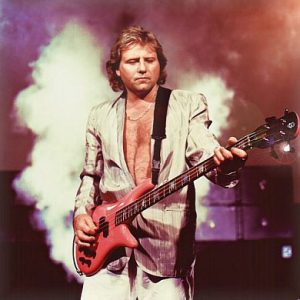 Roger Waters had the same feelings, too .
Roger Waters had the same feelings, too .
He-he, yes (laughs)! There is something warmer in a smaller audience than in a large number of people. People don’t pay to see nervous. At the end of the day, you get paid to give a good show and you can’t do that when you’re nervous. I think most musicians have to learn to be calm, because if you don’t, you can’t play well. Your music is very delicate, the instruments is a very delicate thing. If you are nervous, your hands can’t move really and you will make mistakes.
You are a founding member of King Crimson. Had you realized then how much revolutionary was your music or you treated it as something normal?
I think both things are true. We did know that it was special. Yes, we did. But on the other hand, we had realised that we are a great band, but there were many great bands at the same time. So, we didn’t feel that we were the only great band. We knew that we were a very special band and “In The Court of The Crimson King” was a very special and unique album.
In my opinion, your vocals in “The Court of The Crimson King” song is the most extraordinary performance ever recorded. How difficult was to achieve that perfect result? How spontaneous was that?
I was very spontaneous. You know, the thing is that so much of performing is circumstantial. If you sing a great song and you have great musicians to work with, if the creative inspiration is high, everything is going for you; you can deliver the vocals as you are in a live band. A lot depend on so many other factors. I wish to do my best, whether it’s on a record or a concert. I try to give 100%. Sometimes, it depends on the others. Sometimes things are going for you, and circumstances support what you are doing; other times this is very difficult. I mean, I was in High Voltage Festival in London with ELP and circumstances were very difficult. Technology wasn’t working properly, the situation on stage was very chaotic, it was a tough thing to perform. I think we still did well. It wasn’t easy. Other times, like the California Jam, it was very-very easy. Things just went easily for us.
What do you remember the most from 1969 King Crimson show at Hyde Park supporting Rolling Stones, three days after the death of Brian Jones?
I remember it was the first really big audience that I had ever performed in front of. I think it was maybe 100.000 people.
I think it was more (about 250.000).
It probably was more. It was a very big audience, that was the first thing that was an absolute shock. The second thing of course I remember was the Rolling Stones performing there. I suppose it was the first time I realised that King Crimson was going to be famous.
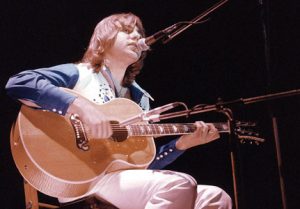 I think Tony Wilson, the legendary BBC presenter watched you in that concert and said that you are the future of rock ’n’ roll, along with Free.
I think Tony Wilson, the legendary BBC presenter watched you in that concert and said that you are the future of rock ’n’ roll, along with Free.
Yes, I suppose in some ways, there was some truth in that. Both bands left their mark in music. Probably, it’s true. It was a time in history where almost every week, there was somebody coming through doing something historic. If it wasn’t Jimi Hendrix, it was the Pink Floyd. If it wasn’t the Pink Floyd, it was The Who. If it wasn’t The Who, it was ELP. If it wasn’t ELP, blah-blah… Every week, there were incredible things happening. It was an incredible time in the history of music.
Do you any have contact today with Robert Fripp?
I haven’t spoken to Robert for a couple of years. But we do meet from time to time. We are all members of King Crimson. We are very friendly, we all get on well together. So, I haven’t seen Robert for a while, no.
You recorded some bass with The Who. How was that experience? Did you feel some kind of “weight” filling for John Entwistle?
I knew John Entwistle, he was a very nice man and a fabulous musician. First of all, I respected him a lot, so playing in place of him was an honour and also it was something I felt very comfortable doing, because I liked him personally. I know Roger (Daltrey, vocals) and Pete (Townshend, guitar/ songwriting). I play with Roger quite often. We did Teenage Cancer Trust in England with Robert Plant (Led Zeppelin, vocals) and other people. We know each other anyway and really it was quite an easy thing, and also at the time we were using Zak Starkey on drums, who is of course Ringo Starr’s son. Another great player! Zak is a great player! That was a very easy thing for me to do.
You toured with Ringo Starr (The Beatles drummer) in 2001. How surreal was being in a band with a legend like Ringo?
Look, Ringo is great! He’s a great drummer, first of all. He has a wonderful feel. To Ringo, feel is everything. He’s not of those people who make things like long drum solos and this kind of things. His remarkable ability is to make a song sounds fantastic.
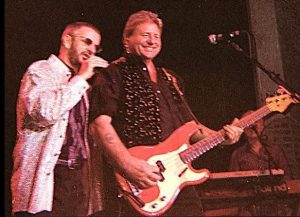 Simon Kirke (Free, Bad Company, Ringo Starr and His-All Starr Band) told me that same. That Ringo is left-handed and plays in his drum kit as a right-handed and many people don’t know that.
Simon Kirke (Free, Bad Company, Ringo Starr and His-All Starr Band) told me that same. That Ringo is left-handed and plays in his drum kit as a right-handed and many people don’t know that.
Yes, he has got this wonderful back beat feel. The first is about the feel and the second is that he’s a wonderful person. He has been into a lot in his life, as you could imagine. He has been in The Beatles and then in a lot of personal hard shifts. He went through a very dark period in his life and he has come out of it, much wiser and richer person. He’s very inspirational. He’s got a lot of wisdom. He doesn’t give any value now in material things. For him, it’s more important things like nature and love. The things that money can’t buy really. That was a really joy. Also, there was a wonderful band. That particular band was great. Sheila E., Howard Jones, Roger Hodgson (Supertramp), Ian Hunter (Mott The Hoople). It was terrific.
Last year your old collaborator Gary Moore died. Do you have happy memories from the period you worked together?
Yes, Gary was a wonderful man and a wonderful guitar player. He was a very big person guy and I think in many ways the audience never really saw the true depth of Gary Moore. Ofcourse, he was Irish, and he focused his career on playing the blues, earlier he played heavy metal rock ’n’ roll. Then he got into the blues, but there was a side in Gary that was far deeper than all of that, that was the Irish music. It was the Irishness in Gary that was useful. I ’ll miss him greatly. He was a wonderful character and world class guitar player.
Did you like the music of the other great progressive rock bands like Pink Floyd, Yes , Genesis and Camel?
Yes, they all were wonderful musicians and bands. They left a remarkable mark on musical history. It’s very interesting now to look back and see how those bands came about. Of course, the music you’re talking about generally called “progressive music”, but I don’t really like those words. Say it “intellectual” or “clever”, which is really what it is. It had European roots, it was inspired by the old European music, rather than from American music like the blues, soul, Motown, gospel. This music, progressive music, progressive music came from classical music, from mainstream music, from all things that were European.
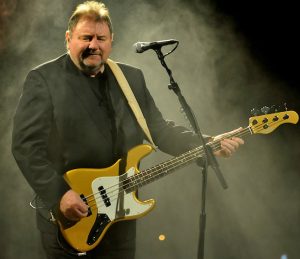 You have played and recorded with many great musicians in your career. Is there anyone you’d like to play with and hasn’t happened yet?
You have played and recorded with many great musicians in your career. Is there anyone you’d like to play with and hasn’t happened yet?
No. Just because I like someone, or I like the music, it doesn’t mean that I would like to play with them. I like people for what they are. When I perform with them, of course it becomes something different. The correct answer is: I would like to play with everybody. It’s funny, it’s like talking to people. I’m happy talking with almost anybody. Some people are more interesting than others. I like playing music with almost anybody. But there isn’t a person to say “Oh, if I don’t play with him, I’ll die”. No. But there are hundreds, if not thousands that I would be happy and proud to play with.
What is the most important thing you have learned after all the years in music industry?
Humility. It’s always someone better just around the corner. Humility is actually a wise thing to carry with you, at all times. Even in the peak of ELP success, I always really knew the truth. And the truth was that we were just lucky. ELP weren’t such great musicians. There are probably better musicians two miles from where you are sitting right now. The fact was that we had a special chemistry together. You know, we could play our instruments, but we were lucky. We were just lucky.
In 2009, Carl Palmer said “Keith Emerson has an ego the size of Wembley”. Do you agree with this?
(Mad laughs) You know, my father used to say: “When you can’t say something good about someone , don’t say something bad”.
He told this in a humourous way.
Yes, I know. Ego is a part of music. It’s certainly a part of some people’s music. To be demonstrative, to demonstrate proudly how good is a composition. Things like that, brought a lot of good things in music. An ego isn’t all bad. It depends on the ego is being used for. That’s the point. Bad ego is a bad thing. Good ego is a good thing. Being proud for being able to play fantastic, there isn’t something wrong with that. So, there is a difference between good and bad ego.
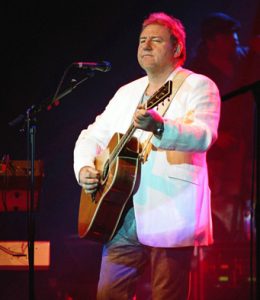 What kind of music are you listening to this period?
What kind of music are you listening to this period?
To be honest with you, I don’t listen to a lot of music, generally. I just finished playing my own music and I try to get away from it since then. Because otherwise, it’s just music, music, music.. It’s good to get away from it, so when you come back to it, it’s fresh again. I do listen to things, I do. I listen to all kinds of things. I’m keen now with a country/western record by Brad Paisley. Do you know him?
No.
Go on iTunes, type “Brad Paisley” and buy the track called “Mr Police Man”. Buy the “Mr Police Man” and listen to the “Mr Police Man”. He’s astonishing guitar player, astonishing songwriter. He’s incredible! He has another song called “Water”. You should listen to it!
You haven’t played in Greece. Is it possible to see you here in the near future?
I would love to play in Greece. I would love to play there. Ofcourse, I’ve been there on holidays. I love the Greek people, I love the Greek culture. It’s funny that now I’m watching this Greek financial drama. I think Greek people should remember that they born the whole civilization in the Western world. They born learning, they born art, they born architecture. All these great things came from Greece. I think the Greek people need to reconnect with their legacy and look back in history and see how great they actually are. The world wouldn’t be like it is, if there wasn’t the incredible influence of the Ancient Greece.
Yes, but major media sell propaganda and terrorize people. That was the result of last Sunday’s elections.
Sometimes, you have to fight back and recapture what belongs to you. If these governments steal the legacy of the people, the people must take it back again.
A huge “THANK YOU” to Mr Greg Lake for his great answers and to Billy James for his valuable help.
Please check out www.greglake.com

